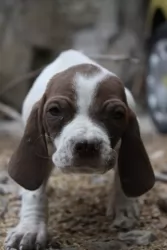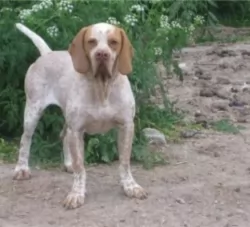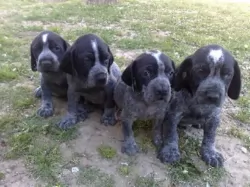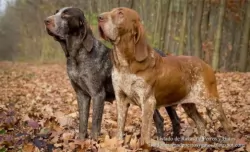 MyDogBreeds
MyDogBreeds St. John's Water Dog is originated from Canada but Pachon Navarro is originated from Spain. Both St. John's Water Dog and Pachon Navarro are having almost same height. St. John's Water Dog may weigh 8 kg / 18 pounds more than Pachon Navarro. St. John's Water Dog may live 3 years less than Pachon Navarro. Both St. John's Water Dog and Pachon Navarro has almost same litter size. Both St. John's Water Dog and Pachon Navarro requires Low maintenance.
St. John's Water Dog is originated from Canada but Pachon Navarro is originated from Spain. Both St. John's Water Dog and Pachon Navarro are having almost same height. St. John's Water Dog may weigh 8 kg / 18 pounds more than Pachon Navarro. St. John's Water Dog may live 3 years less than Pachon Navarro. Both St. John's Water Dog and Pachon Navarro has almost same litter size. Both St. John's Water Dog and Pachon Navarro requires Low maintenance.
 The breed known as the St. John’s water dog is an extinct landrace breed. They were domestic dogs found in Newfoundland and at times were called the lesser Newfoundland. There is not much information available about the other breeds that went into its development. Hypothetically it is believed they are a mix of the Irish, Old English and Portuguese dogs bred to work.
The breed known as the St. John’s water dog is an extinct landrace breed. They were domestic dogs found in Newfoundland and at times were called the lesser Newfoundland. There is not much information available about the other breeds that went into its development. Hypothetically it is believed they are a mix of the Irish, Old English and Portuguese dogs bred to work.
It is also thought that other breeds in their family tree, descending from them, include the Golden Retriever, the Flat-Coated Retriever, the Chesapeake Bay Retriever, the Labrador and the Curly-Coated Retriever. The Newfoundland is also related to the St. Johns Water Dog through the line of Rafeirio do Alenteios that Portuguese fisherman brought to the island.
The breed was exported to England in the 19th century and early 20th. There the breeds of retrievers were developed. In Canada during this time frame restrictions were placed on dog ownership in order to encourage people to raise sheep. At the same time England imposed a long quarantine on all animals coming into the country in order to get rid of rabies. These two factors contributed greatly to the extinction of the breed. It seems the last two dogs were seen in a remote area in the 1980’s. All attempts to save the breed failed.
 Known also as the Navarra Pointer, this is a Spanish hunting dog native to Navarre, Spain and descended from the extinct Old Spanish Pointer.
Known also as the Navarra Pointer, this is a Spanish hunting dog native to Navarre, Spain and descended from the extinct Old Spanish Pointer.
Major kennel clubs don’t recognize this dog as a standardized breed, but the Spanish Kennel Club has accepted the Pachón Navarro as a breed.
It is believed that this dog has also descended from other hounds as well as the Talbot hounds. It isn’t a new breed as it is thought that the dog originated in the 12th century already. There were times when the dog almost became extinct but efforts to preserve it have been made and to also establish it as a standardized breed.
 St. John’s Water Dog is strong, medium sized and stocky. They looked more like English Labs than American Labs. They had a thick, short coat, loved swimming, had a lot of endurance and rudder tail. It was also described as a thin, black dog with short hair. They had white patches on their chest and feet. His nose was thin and tapered, his legs powerful, his chest muscular. The breed is quick, swims, runs quickly and is a fighter as well.
St. John’s Water Dog is strong, medium sized and stocky. They looked more like English Labs than American Labs. They had a thick, short coat, loved swimming, had a lot of endurance and rudder tail. It was also described as a thin, black dog with short hair. They had white patches on their chest and feet. His nose was thin and tapered, his legs powerful, his chest muscular. The breed is quick, swims, runs quickly and is a fighter as well.
Never accepted by any major kennel club except as a foundation breed. They became extinct.
 This dog is large sized, standing at between 48 and 57cm in height and weighing between 27 and 33kg. A most unusual feature and characteristic unseen in dogs in general is his split or double nose. The nose of the dog serves the same purpose however, as with any other dog.
This dog is large sized, standing at between 48 and 57cm in height and weighing between 27 and 33kg. A most unusual feature and characteristic unseen in dogs in general is his split or double nose. The nose of the dog serves the same purpose however, as with any other dog.
The head is fairly large with a broad forehead. The broad head of the dog is generally solid colored. The coat of the coat of the dog is short and of a hard texture. Colors of the coat are white and brown or white and black or white and an orangey color with ticking.
The eyes are large and brown, the ears are long and broad with a rounded tip and the tail is long too. These dogs have a strong, sturdy body with strong legs.
The Pachon Navarro is a friendly, social, intelligent, loving and loyal dog. He is also gentle and docile with an amicable nature, making him a splendid choice for those with children in the home as well as pets.
He is athletic and energetic and is going to need a good dose of daily exercise. Apart from their strong hunting instincts, they make excellent family pets and companions and is most certainly not a dog to be put outdoors day after day without the contact of his human family.
He is intelligent and a quick learner and will benefit from training and socialization as this makes him obedient and it also bring about positive changes with any bad behavior from this excellent pet.
He requires a kind, firm, patient and consistent owner. This particular dog won’t be suited to living in a tiny property in the city, as they require a lot of space to run and exercise.
 3.Adaptability large need fence, they are not large dogs but they need outdoor space
3.Adaptability large need fence, they are not large dogs but they need outdoor space
 The Pachón Navarro is an active, friendly, playful, affectionate dog and he makes a great family pet. He will however want lots of outdoor exercise, making him a suitable companion for active owners. Inactive city dwellers should think of keeping a more docile kind of indoor pet.
The Pachón Navarro is an active, friendly, playful, affectionate dog and he makes a great family pet. He will however want lots of outdoor exercise, making him a suitable companion for active owners. Inactive city dwellers should think of keeping a more docile kind of indoor pet.
Your Pachón Navarro just loves the company of his human family and will be dejected if made to spend all his time outside and away from his owner.
He also takes his role as guardian and protector seriously. Give him what he requires and make him part of the family and he will be a most remarkable friend and companion.
 There is no documented history of any genetic or hereditary illnesses in the breed. However, it seems rational to believe they suffered from ailments similar to Labradors and newfoundland though they are smaller dogs.
There is no documented history of any genetic or hereditary illnesses in the breed. However, it seems rational to believe they suffered from ailments similar to Labradors and newfoundland though they are smaller dogs.
 Pachon Navarros are generally healthy dogs and you’re not likely to spend much time at the vets with these dogs. They can reach up to 15 years of age if looked after well, but with the long ears they are prone to ear infections.
Pachon Navarros are generally healthy dogs and you’re not likely to spend much time at the vets with these dogs. They can reach up to 15 years of age if looked after well, but with the long ears they are prone to ear infections.
Moisture, wax and dirt can all build up inside the dog's ears and this can cause a painful ear infection with the dog scratching and pawing at his ear.
Bloat is another illness to look out for and you'll notice your dog is lethargic and has a swollen, hard stomach with gas being trapped inside. The condition is life threatening and will require a trip to the vet.
 1Feeding the puppy – Don’t overfeed – they have a propensity toward obesity. Feed high quality, high protein 3 x a day.
1Feeding the puppy – Don’t overfeed – they have a propensity toward obesity. Feed high quality, high protein 3 x a day.
2.Feeding the adult – Don’t overfeed. Feed a high quality, high protein 1-2 x a day.
4. Games and Exercises – They need space to run and they love to explore. They would also love to be near water where they could swim. Good at dock diving, field trials, flyball and frisbee.
 Your Pachon Navarros is a low maintenance dog and you will just be required to give him a good brush. He is a moderate shedder and this brushing down will keep the skin and coat healthy.
Your Pachon Navarros is a low maintenance dog and you will just be required to give him a good brush. He is a moderate shedder and this brushing down will keep the skin and coat healthy.
Because of his long, floppy ears, you will need to check inside them because moisture, dirt and wax can build up and encourage an ear infection. Don’t try to clean inside your pet’s ears if you’re not sure how, rather find out about cleaning the ears from the vet.
The nails will also need to be clipped as well as checking regularly on the eyes and teeth.
Your Pachon Navarro is a hardworking dog and you want to ensure tasty, palatable food that is properly digested and eliminated without problems. If you feed your dog a commercially manufactured dog food, choose the best quality and check out the labels.
Make sure that the food doesn’t contain lots of preservatives, colorants and fillers. Some of the best kibble has the right balance of vitamins and minerals in them. With these kind of hunting dogs, it is best to feed your dog hours before vigorous exercise such as a hunt.
Try and vary the regular kibble by adding in simple, but tasty home-made food occasionally. Dogs appreciate simple food without spices and exotic ingredients as its keeps their stomachs free from pain, gas and bloat.
Some chopped up boiled chicken, some brown rice or pasta and some vegetables such as sweet potato, carrots and spinach is super healthy for your pet as well as adding in a little bit of raw meat from time to time.
Remember clean, fresh water must be constantly available.